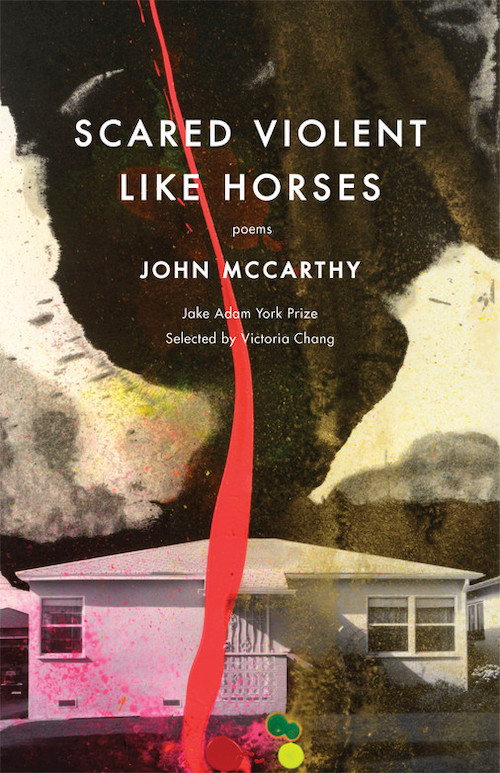I was too young to call him a friend, but I had a classmate who snuck up behind a horse and now his body is made of a long time ago. He is the quiet space in my memory where he never sat next to me again. Back then, everyone I ever called a friend held fire in their fists when they talked to me. Their fists were dingy, grime-covered, and grease-slick as if they were made of horsehair, as if they were untamed and lonely, galloping and wind-swollen. We didn’t know how to talk about loss, so we made each other lose. We went to fields to see who could take the most damage. We went to fields that smelled like the boy who became an empty space on a Tuesday morning a long time ago. Now, because I am scared of time and how it moves, I look down at my fists that didn’t always want to, but have hit so many friends that the broken knuckles look like bruised magnolias. Listen to me, Please, when I knock or bang on the table or door and beg for attention. Please, I don’t know how to ask for forgiveness. I don’t know how to let anything go. I don’t know how to say anything else about the boy who had a buzz cut and a flat head, the boy who was kicked in the face by a horse and died looking up at the sky. The boy’s father must have found his son with a crushed face, and while running back to the house with his own son in his arms, must have said something raging and spiteful to God. This memory is my starting point when I think backward and apologize for all of our fists coiled tight as key rings. How could we not break the mirror we look at in the morning? How could we not swing at the different versions of our faces staring back between the fissures? The hurt and mangled parts of us loved the blood dried brown on our skewbald knuckles, and we had nightmares of being reined in. We needed someone to help us change. We needed someone to force us into confronting the uselessness of our violence. But no one came, and our fists swelled unbridled and restless, wild and afraid.
Scared Violent Like Horses
Feature Date
- April 23, 2019
Series
Selected By
Share This Poem
Print This Poem
From Scared Violent Like Horses by John McCarthy (Minneapolis: Milkweed Editions, 2019). Copyright © 2019 by John McCarthy. Reprinted with permission from Milkweed Editions. milkweed.org

John McCarthy is the author of Scared Violent Like Horses, selected by Victoria Chang as winner of the Jake Adam York Prize, and Ghost Country, named a Best Poetry Book of 2016 by the Chicago Review of Books. He serves as an editor of RHINO magazine and the Quiddity international literary journal and public radio program.

Minneapolis , Minnesota
Selected by Victoria Chang as winner of the Jake Adam York Prize, John McCarthy’s Scared Violent Like Horses is a deeply personal examination of violent masculinity, driven by a yearning for more compassionate ways of being.
McCarthy’s flyover country is populated by a family strangled by silence: a father drunk and mute in the passenger seat, a mother sinking into bed like a dish at the bottom of a sink, and a boy whose friends play punch-for-punch for fun. He shows us a boy struggling to understand pain carried down through generations and how quickly abandonment becomes a silent kind of violence; “how we deny each other, daily, so many chances to care,” and how “we didn’t know how to talk about loss, / so we made each other lose.” Constant throughout is the brutality of the Midwestern landscape that, like the people who inhabit it, turns out to be beautiful in its vulnerability: sedgegrass littered with plastic bags floating like ghosts, dilapidated houses with abandoned Fisher Price toys in the yard, and silos of dirt and rust under a sky that struggles to remember the ground below.
With arresting lyricism and humility, Scared Violent Like Horses attends to the insecurities that hide at the heart of what’s been turned harsh, offering a smoldering but redemptive and tender view of the lost, looked over, and forgotten.
Praise for Scared Violent Like Horses
"McCarthy's book of Midwestern threnodies begins in image and ends in solemnity . . . McCarthy's poems are profluent stories―a joy to marvel at this skill, impressive considering the book's bleak landscape."
―The Millions
“McCarthy has whittled out a sense of freedom from the heartache of the past, and the reader is left with a remarkable vision.”
―Booklist
“Scared Violent Like Horses is the story of a ‘lost boy with a quiet ache’―a story about a boy and a young man who grows up amid the landscape of a vast yet specific Midwest filled with switchgrass, scarecrows, dead leaves, dirt, factories, and family and childhood people. It’s the people the speaker is really writing about―the speaker’s connection and disconnection with those who populate the landscape and the feeling of being different or not fully belonging. John McCarthy’s impulse is narrative but this impulse is struck by the lightning of his linguistic powers, as in the poem, ‘Switchgrass’: ‘A mangled cat mats the crankshaft and fan belt, / fur-shredded and soaked.’ Unusual images and figurative language are in abundance: ‘The cornfield’s tassels are wicks burning toward the sky and the fields / are sutured by utility poles marching like a procession of crosses . . .’ Ultimately, what the reader is left with is a stunning overlap of lost boy and lost landscape glimpsed through the lens of a gifted poet’s magical linguistic and storytelling abilities.”
―Victoria Chang
“Scared Violent Like Horses is a book that grabs the reader with its insistent lyric beauty. It’s a book where its speaker is haunted by the empty violence and despair of a Midwestern landscape full of “smolder and silence.” It’s a landscape usually underestimated and derided―the “flyover country” of condescending editorials and talk show chatter. But in the hands of this poet, these hardscrabble landscapes, these haunts of hurt and hurting families and friends who show love through their thrown punches―these scenes become so relentlessly beautiful that a reader cannot look away. John McCarthy’s poems have had their hold on me for a long time, and I defy anyone who reads this book not to walk away shaken, stirred, and ultimately, utterly changed.”
―Allison Joseph
“Throbbing with the ‘quiet ache’ of the flown-over, John McCarthy’s extraordinary perception and lingual deftness unveil the grit and humble grandeur of Springfield’s north end. Rural Illinois’s emotional brutality is rendered raw as we see into and through a young man reaching beyond the debris of a violent and damaged lineage, in search of a gentler, less destructive self.”
―Matt Rasmussen
“In this devastating, gorgeous collection, John McCarthy opens up ‘[t]he hurt and mangled parts of us,’ the places in us where we are ‘hollering fervent and raw,’ to explore the pain of abandonment and the purity of that loneliness, so that we might understand how trauma breeds desolation. ‘How could we not / break the mirror we look at in the morning?’ How do we escape the desolation we are? ‘I carved my scalp open,’ he writes, ‘until I could feel the smoke leaving my body,’ and such viscerally brutal moments in this book remind us that ‘there are many different kinds of beauty.’ McCarthy is a master of transforming his world into every kind.”
―Sara Eliza Johnson
Poetry Daily Depends on You
With your support, we make reading the best contemporary poetry a treasured daily experience. Consider a contribution today.



